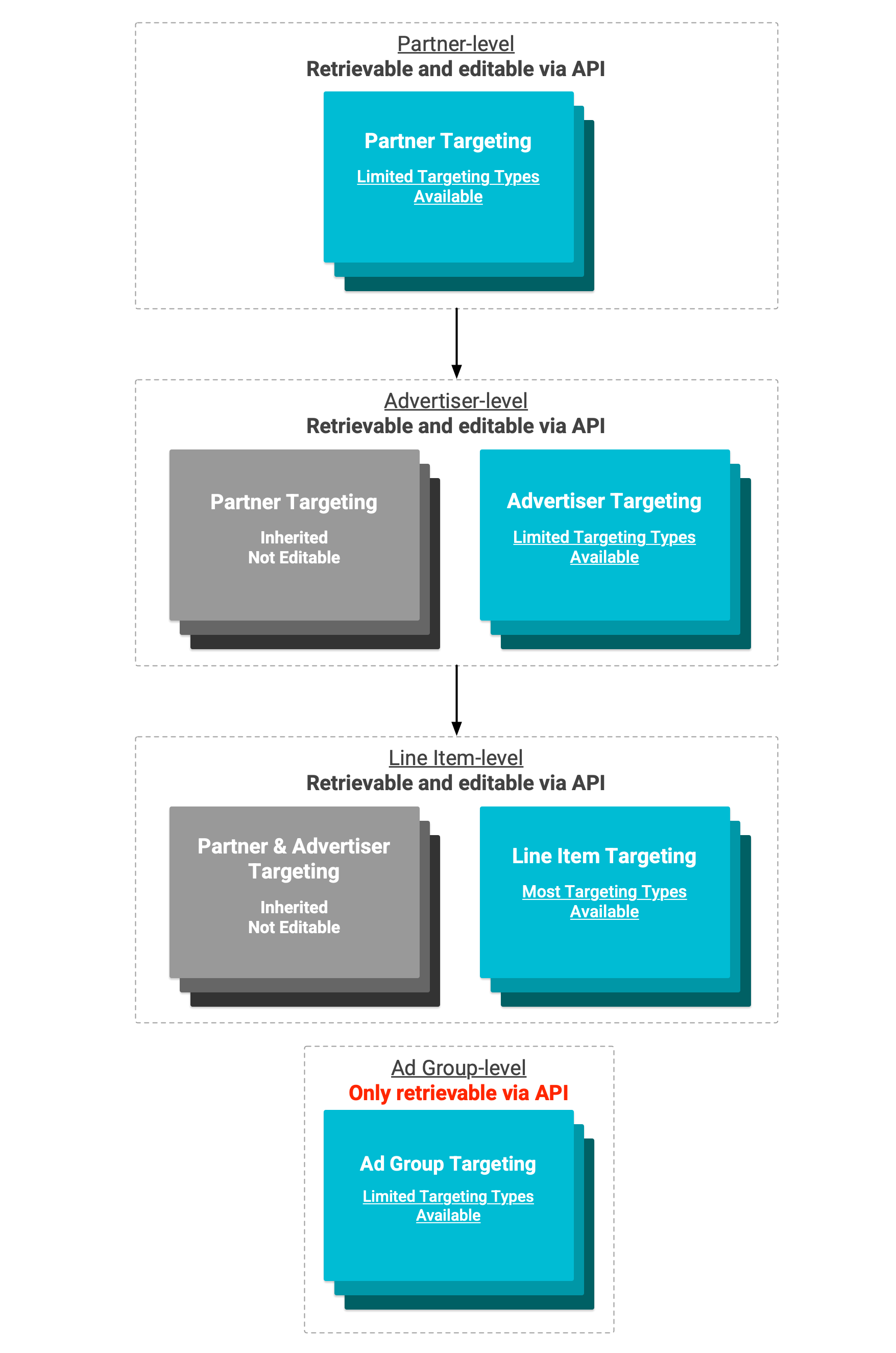การจัดการการกำหนดเป้าหมายทรัพยากรเป็นฟีเจอร์หลักของ Display & Video 360 API คุณกําหนดการกําหนดเป้าหมายให้กับทรัพยากรหลายประเภทได้ และใช้ทรัพยากรอื่นๆ และพื้นที่รหัสจํานวนหนึ่ง หน้านี้จะอธิบายข้อจำกัดที่ควรทราบและแนวทางปฏิบัติแนะนำในการนำบริการตัวเลือกการกำหนดเป้าหมายที่กำหนดใน Display & Video 360 API มาใช้
ใช้การรับค่าการกำหนดเป้าหมาย
ทรัพยากรย่อยสามารถรับช่วงการกำหนดเป้าหมายที่กำหนดให้กับทรัพยากรบางรายการได้ คุณสามารถเรียกดูตัวเลือกการกำหนดเป้าหมายที่ทรัพยากรย่อยรับค่ามาได้ แต่จะแก้ไขไม่ได้ในระดับทรัพยากรย่อย ซึ่งจะช่วยให้การตั้งค่าความปลอดภัยของแบรนด์และ การกำหนดเป้าหมายอื่นๆ มีผลบังคับใช้กับพาร์ทเนอร์หรือผู้ลงโฆษณาทั้งหมด
คุณดูเส้นทางการรับช่วงได้ในแผนภาพด้านล่าง

ตามที่ระบุไว้ในแผนภาพ ระดับการกำหนดเป้าหมายบางระดับรองรับเฉพาะชุดย่อยของ ประเภทการกำหนดเป้าหมาย ซึ่งหมายความว่าคุณไม่สามารถตั้งค่าตัวเลือกการกำหนดเป้าหมายบางอย่างในระดับที่สูงกว่า และรับค่ามาได้ แต่ต้องตั้งค่าในระดับที่ต่ำกว่าแทน
การรับช่วงในแหล่งข้อมูลของ YouTube และพาร์ทเนอร์
การรับค่าการกำหนดเป้าหมายจะไม่แสดงสำหรับแหล่งข้อมูล YouTube และพาร์ทเนอร์ใน
Display & Video 360 API การกำหนดเป้าหมายที่กลุ่มโฆษณาได้รับจะไม่สามารถ
ดึงข้อมูลได้ในระดับAdGroup และการกำหนดเป้าหมายบน YouTube
ที่กำหนดให้กับทรัพยากรหลักจะไม่ได้รับการรับค่าจากทรัพยากรย่อย
หากต้องการดึงการตั้งค่าการกำหนดเป้าหมายที่ใช้งานได้ทั้งหมดสำหรับกลุ่มโฆษณา คุณควรดึงตัวเลือกการกำหนดเป้าหมายที่กำหนดไว้สำหรับกลุ่มโฆษณา รายการโฆษณาหลัก และผู้ลงโฆษณาหลัก
โปรดทราบว่าการกำหนดเป้าหมายจะกำหนดไว้เมื่อสร้างรายการโฆษณา
นอกเหนือจากตัวเลือกการกำหนดเป้าหมายที่รับช่วงมาแล้ว การกำหนดเป้าหมายส่วนใหญ่จะกำหนดได้หลังจากสร้างรายการโฆษณาแล้วเท่านั้น อย่างไรก็ตาม การกำหนดเป้าหมายบางประเภทมี ชุดย่อยของค่าเริ่มต้นที่กำหนดให้กับรายการโฆษณาเมื่อสร้างรายการโฆษณา ประเภทการกำหนดเป้าหมายมีดังนี้
การพยายามสร้างตัวเลือกการกำหนดเป้าหมายที่มีอยู่หรือลบตัวเลือกการกำหนดเป้าหมายที่กำหนดที่ไม่มีอยู่
จะทำให้เกิดข้อผิดพลาด ดังนั้นเราขอแนะนำให้คุณทราบชุดการกำหนดเป้าหมายทั้งหมด
ที่กำหนดให้กับรายการโฆษณาเมื่อสร้าง หากต้องการดึงข้อมูล
การกำหนดเป้าหมายที่กำหนดให้กับรายการโฆษณาในประเภทการกำหนดเป้าหมายต่างๆ ให้ใช้
advertisers.lineItems.bulkListAssignedTargetingOptions
นอกจากนี้ ระบบจะตั้งค่าบางอย่างโดยค่าเริ่มต้นเมื่อไม่มีการกำหนดตัวเลือกการกำหนดเป้าหมายประเภทนั้นให้กับทรัพยากร เช่น หากทรัพยากรไม่มีตัวเลือกการกำหนดเป้าหมาย
TARGETING_TYPE_AUTHORIZED_SELLER_STATUS
ที่กำหนดไว้ แสดงว่าทรัพยากรนั้นใช้สถานะ "ผู้ขายและตัวแทนจำหน่ายโดยตรงที่ได้รับอนุญาต"
แก้ไขการกำหนดเป้าหมายของ YouTube และพาร์ทเนอร์ไม่ได้
คุณอัปเดตการกำหนดเป้าหมายสำหรับแคมเปญ YouTube และพาร์ทเนอร์โดยเฉพาะไม่ได้โดยใช้ API ของ Display & Video 360
การกำหนดเป้าหมาย YouTube และพาร์ทเนอร์ประกอบด้วยการกำหนดเป้าหมายทั้งหมดที่กำหนดให้กับ รายการโฆษณา YouTube และพาร์ทเนอร์และกลุ่มโฆษณาโดยตรง รวมถึง การกำหนดเป้าหมายประเภทต่อไปนี้
TARGETING_TYPE_SESSION_POSITIONTARGETING_TYPE_YOUTUBE_CHANNELTARGETING_TYPE_YOUTUBE_VIDEO
คุณอัปเดตการกำหนดเป้าหมายนี้ได้โดยใช้ UI ของ Display & Video 360 โดยตรง หรือโดยการอัปโหลดไฟล์ Structured Data
กำหนดการกำหนดกลุ่มเป้าหมายด้วยตัวเลือกเดียว
ระบบจะกําหนดตัวเลือกการกําหนดเป้าหมายสําหรับการกําหนดเป้าหมายประเภทส่วนใหญ่แยกกัน การกำหนดกลุ่มเป้าหมาย
ของกลุ่มไม่ได้เป็นไปตามรูปแบบโมดูลาร์นี้ แต่จะกำหนด
ในออบเจ็กต์รายละเอียดการกำหนดกลุ่มเป้าหมายเดียวที่กำหนดค่าได้
ซึ่งแสดงรหัสของกลุ่มเป้าหมายที่จะรวมและยกเว้นเมื่อแสดงโฆษณา
assignedTargetingOptionId สำหรับตัวเลือกกลุ่มเป้าหมายนี้
เมื่อกำหนดแล้วจะเป็น "audienceGroup" เสมอ
การออกแบบนี้หมายความว่าการเปลี่ยนแปลงการกำหนดเป้าหมายกลุ่มเป้าหมายจะต้องดำเนินการโดย
ก่อนอื่นให้ลบตัวเลือกการกำหนดเป้าหมายกลุ่มเป้าหมายที่มีอยู่ซึ่งกำหนดไว้
แล้วสร้างตัวเลือกการกำหนดเป้าหมายกลุ่มเป้าหมายใหม่
พร้อมการเปลี่ยนแปลงที่ต้องการ ซึ่งทำได้ในคำขอเดียว
โดยใช้
advertisers.lineItems.bulkEditAssignedTargetingOptions
ตัวอย่างวิธีอัปเดตการกำหนดกลุ่มเป้าหมายเพื่อกำหนดเป้าหมายกลุ่มเป้าหมายเพิ่มเติมของ Google ในเชิงบวก มีดังนี้
Java
long advertiserId = advertiser-id; long lineItemId = line-item-id List<Long> addedGoogleAudienceIds = Arrays.asList(google-audience-id-to-add,...); // Build Google audience targeting settings objects to add to audience // targeting. ArrayList<GoogleAudienceTargetingSetting> newGoogleAudienceSettings = new ArrayList<GoogleAudienceTargetingSetting>(); // Convert list of Google Audience IDs into list of settings. for (Long googleAudienceId : addedGoogleAudienceIds) { newGoogleAudienceSettings.add(new GoogleAudienceTargetingSetting() .setGoogleAudienceId(googleAudienceId)); } // Create relevant bulk edit request objects. BulkEditLineItemAssignedTargetingOptionsRequest requestContent = new BulkEditLineItemAssignedTargetingOptionsRequest(); AudienceGroupAssignedTargetingOptionDetails updatedAudienceGroupDetails; ArrayList<DeleteAssignedTargetingOptionsRequest> audienceGroupDeleteRequests = new ArrayList<DeleteAssignedTargetingOptionsRequest>(); try { // Retrieve existing audience group targeting. AssignedTargetingOption existingAudienceGroupTargetingOption = service .advertisers() .lineItems() .targetingTypes() .assignedTargetingOptions() .get( advertiserId, lineItemId, "TARGETING_TYPE_AUDIENCE_GROUP", "audienceGroup" ).execute(); // Extract existing audience group targeting details. updatedAudienceGroupDetails = existingAudienceGroupTargetingOption.getAudienceGroupDetails(); // Build and add delete request for existing audience group targeting. ArrayList<String> deleteAudienceGroupAssignedTargetingIds = new ArrayList<String>(); deleteAudienceGroupAssignedTargetingIds.add("audienceGroup"); audienceGroupDeleteRequests .add(new DeleteAssignedTargetingOptionsRequest() .setTargetingType("TARGETING_TYPE_AUDIENCE_GROUP") .setAssignedTargetingOptionIds( deleteAudienceGroupAssignedTargetingIds ) ); } catch (GoogleJsonResponseException e) { updatedAudienceGroupDetails = new AudienceGroupAssignedTargetingOptionDetails(); } // Set delete requests in edit request. requestContent.setDeleteRequests(audienceGroupDeleteRequests); // Construct new group of Google Audiences to include in targeting. GoogleAudienceGroup updatedIncludedGoogleAudienceGroup = updatedAudienceGroupDetails.getIncludedGoogleAudienceGroup(); if (updatedIncludedGoogleAudienceGroup != null) { List<GoogleAudienceTargetingSetting> updatedGoogleAudienceSettings = updatedIncludedGoogleAudienceGroup.getSettings(); updatedGoogleAudienceSettings.addAll(newGoogleAudienceSettings); updatedIncludedGoogleAudienceGroup .setSettings(updatedGoogleAudienceSettings); } else { updatedIncludedGoogleAudienceGroup = new GoogleAudienceGroup(); updatedIncludedGoogleAudienceGroup.setSettings(newGoogleAudienceSettings); } // Add new Google Audience group to audience group targeting details. updatedAudienceGroupDetails .setIncludedGoogleAudienceGroup(updatedIncludedGoogleAudienceGroup); // Create new targeting option to assign. AssignedTargetingOption newAudienceGroupTargeting = new AssignedTargetingOption(); newAudienceGroupTargeting .setAudienceGroupDetails(updatedAudienceGroupDetails); // Build audience group targeting create request and add to list of create // requests. ArrayList<AssignedTargetingOption> createAudienceGroupAssignedTargetingOptions = new ArrayList<AssignedTargetingOption>(); createAudienceGroupAssignedTargetingOptions.add(newAudienceGroupTargeting); ArrayList<CreateAssignedTargetingOptionsRequest> targetingCreateRequests = new ArrayList<CreateAssignedTargetingOptionsRequest>(); targetingCreateRequests.add(new CreateAssignedTargetingOptionsRequest() .setTargetingType("TARGETING_TYPE_AUDIENCE_GROUP") .setAssignedTargetingOptions( createAudienceGroupAssignedTargetingOptions ) ); // Set create requests in edit request. requestContent.setCreateRequests(targetingCreateRequests); // Configure and execute the bulk list request. BulkEditLineItemAssignedTargetingOptionsResponse response = service.advertisers().lineItems() .bulkEditLineItemAssignedTargetingOptions( advertiserId, lineItemId, requestContent).execute();
Python
advertiser_id = advertiser-id line_item_id = line-item-id added_google_audiences = [google-audience-id-to-add,...] # Build Google audience targeting settings objects to create. new_google_audience_targeting_settings = [] for google_audience_id in added_google_audiences: new_google_audience_targeting_settings.append( {'googleAudienceId': google_audience_id} ) # Retrieve any existing line item audience targeting. retrieved_audience_targeting = service.advertisers().lineItems( ).targetingTypes().assignedTargetingOptions().get( advertiserId=advertiser_id, lineItemId=line_item_id, targetingType="TARGETING_TYPE_AUDIENCE_GROUP", assignedTargetingOptionId="audienceGroup" ).execute() updated_audience_group_details = {} # Copy over any existing audience targeting. if 'audienceGroupDetails' in retrieved_audience_targeting: updated_audience_group_details = retrieved_audience_targeting[ 'audienceGroupDetails'] # Append the new Google audience IDs to any existing positive Google # audience targeting. if 'includedGoogleAudienceGroup' in updated_audience_group_details: updated_audience_group_details[ 'includedGoogleAudienceGroup']['settings'].extend( new_google_audience_targeting_settings) else: updated_audience_group_details['includedGoogleAudienceGroup'] = { 'settings': new_google_audience_targeting_settings } # Build bulk edit request. bulk_edit_request = { 'deleteRequests': [ { 'targetingType': "TARGETING_TYPE_AUDIENCE_GROUP", 'assignedTargetingOptionIds': [ "audienceGroup" ] } ], 'createRequests': [ { 'targetingType': "TARGETING_TYPE_AUDIENCE_GROUP", 'assignedTargetingOptions': [ {'audienceGroupDetails': updated_audience_group_details} ] } ] } # Update the audience targeting updated_audience_targeting = service.advertisers().lineItems( ).bulkEditLineItemAssignedTargetingOptions( advertiserId=advertiser_id, lineItemId=line_item_id, body=bulk_edit_request ).execute()
PHP
$advertiserId = advertiser-id; $lineItemId = line-item-id; $addedGoogleAudienceIds = array(google-audience-id-to-add,...); // Convert list of Google Audience IDs into list of Google audience // settings. $newGoogleAudienceSettings = array(); foreach ($addedGoogleAudienceIds as $googleAudienceId) { $newSetting = new Google_Service_DisplayVideo_GoogleAudienceTargetingSetting(); $newSetting->setGoogleAudienceId($googleAudienceId); $newGoogleAudienceSettings[] = $newSetting; } // Create a bulk edit request. $requestBody = new Google_Service_DisplayVideo_BulkEditLineItemAssignedTargetingOptionsRequest(); $audienceGroupDeleteRequests = array(); try { // Retrieve existing audience group targeting. $existingAudienceGroupTargetingOption = $this ->service ->advertisers_lineItems_targetingTypes_assignedTargetingOptions ->get( $advertiserId, $lineItemId, 'TARGETING_TYPE_AUDIENCE_GROUP', 'audienceGroup' ); // Extract existing audience group targeting details. $updatedAudienceGroupDetails = $existingAudienceGroupTargetingOption ->getAudienceGroupDetails(); // Build and add delete request for existing audience group // targeting. $deleteAudienceGroupAssignedTargetingIds = array(); $deleteAudienceGroupAssignedTargetingIds[] = "audienceGroup"; $audienceGroupDeleteRequest = new Google_Service_DisplayVideo_DeleteAssignedTargetingOptionsRequest(); $audienceGroupDeleteRequest ->setTargetingType('TARGETING_TYPE_AUDIENCE_GROUP'); $audienceGroupDeleteRequest ->setAssignedTargetingOptionIds( $deleteAudienceGroupAssignedTargetingIds ); $audienceGroupDeleteRequests[] = $audienceGroupDeleteRequest; } catch (\Exception $e) { $updatedAudienceGroupDetails = new Google_Service_DisplayVideo_AudienceGroupAssignedTargetingOptionDetails(); } // Set delete requests in edit request. $requestBody->setDeleteRequests($audienceGroupDeleteRequests); // Construct new group of Google audiences to include in targeting. $updatedIncludedGoogleAudienceGroup = $updatedAudienceGroupDetails ->getIncludedGoogleAudienceGroup(); if (!empty($updatedIncludedGoogleAudienceGroup)) { // Get existing settings. $updatedGoogleAudienceSettings = $updatedIncludedGoogleAudienceGroup->getSettings(); // Add new Google audiences to existing list. $updatedGoogleAudienceSettings = array_merge( $updatedGoogleAudienceSettings, $newGoogleAudienceSettings ); // Set updated Google audience list. $updatedIncludedGoogleAudienceGroup ->setSettings($updatedGoogleAudienceSettings); } else { // Create new Google audience group. $updatedIncludedGoogleAudienceGroup = new Google_Service_DisplayVideo_GoogleAudienceGroup(); // Set list of new Google audiences for targeting. $updatedIncludedGoogleAudienceGroup ->setSettings($newGoogleAudienceSettings); } // Add new Google Audience group to audience group targeting details. $updatedAudienceGroupDetails ->setIncludedGoogleAudienceGroup( $updatedIncludedGoogleAudienceGroup ); // Create new targeting option to assign. $newAudienceGroupTargeting = new Google_Service_DisplayVideo_AssignedTargetingOption(); $newAudienceGroupTargeting ->setAudienceGroupDetails($updatedAudienceGroupDetails); // Build audience group targeting create request and add to list of // create requests. $createAudienceGroupAssignedTargetingOptions = array(); $createAudienceGroupAssignedTargetingOptions[] = $newAudienceGroupTargeting; $createAudienceGroupTargetingRequest = new Google_Service_DisplayVideo_CreateAssignedTargetingOptionsRequest(); $createAudienceGroupTargetingRequest->setTargetingType( "TARGETING_TYPE_AUDIENCE_GROUP" ); $createAudienceGroupTargetingRequest->setAssignedTargetingOptions( $createAudienceGroupAssignedTargetingOptions ); $createRequests[] = $createAudienceGroupTargetingRequest; // Set create requests in edit request. $requestBody->setCreateRequests($createRequests); // Call the API, editing the assigned targeting options for the // identified line item. $response = $this ->service ->advertisers_lineItems ->bulkEditLineItemAssignedTargetingOptions( $advertiserId, $lineItemId, $requestBody );
เตรียมพร้อมสำหรับตัวเลือกการกำหนดเป้าหมายที่จะเลิกใช้งาน
ตัวเลือกการกำหนดเป้าหมายไม่ได้คงที่ และอาจมีการเลิกใช้งานตัวเลือกบางรายการเป็นครั้งคราว เมื่อเลิกใช้งานแล้ว ตัวเลือกการกำหนดเป้าหมายจะไม่ส่งผลต่อการแสดงโฆษณาของรายการโฆษณา หลังจากเลิกใช้งานแล้ว ระบบจะยกเลิกการกำหนดตัวเลือกเหล่านี้จากรายการโฆษณาและคำขอที่มีอยู่ซึ่งพยายามดึงหรือกำหนดตัวเลือกเหล่านี้จะทำให้เกิดข้อผิดพลาด
เราขอแนะนำให้คุณตรวจสอบรหัสตัวเลือกการกำหนดเป้าหมายที่จัดเก็บไว้เป็นประจำเพื่อหลีกเลี่ยงข้อผิดพลาดเหล่านี้ เพื่อประหยัดโควต้า เราขอแนะนำให้คุณแคชรหัสที่ใช้เป็นประจำ อย่างไรก็ตาม การจัดเก็บรหัสหมายความว่าคุณอาจไม่ทราบว่าตัวเลือกการกำหนดเป้าหมายถูกเลิกใช้งานแล้ว ด้วยเหตุนี้ คุณจึงควรใช้ targetingOptions.targetingTypes.get เป็นประจำเพื่อ
ดึงรหัสตัวเลือกการกำหนดเป้าหมายที่จัดเก็บไว้ทั้งหมด เพื่อยืนยันว่า Display & Video 360 ยังคงรองรับรหัสเหล่านั้น
ดูรายละเอียดเกี่ยวกับการเลิกใช้งานที่สำคัญก่อนหน้านี้และที่กำลังจะเกิดขึ้นได้ที่หน้าการเลิกใช้งานที่ประกาศแล้ว
อย่าส่งคำขอพร้อมกันเพื่ออัปเดตสินค้าในรายการสั่งซื้อเดียวกัน
การพยายามอัปเดตการตั้งค่าหรือการกำหนดเป้าหมายที่กำหนดให้กับรายการโฆษณาเดียว โดยใช้คำขอพร้อมกันหลายรายการจะแสดงข้อผิดพลาด คำขอที่เกี่ยวข้อง ได้แก่
advertisers.lineItems.bulkEditAssignedTargetingOptionsadvertisers.lineItems.bulkUpdateadvertisers.lineItems.patchadvertisers.lineItems.targetingTypes.assignedTargetingOptions.createadvertisers.lineItems.targetingTypes.assignedTargetingOptions.delete
หากต้องการเพิ่มหรือนำตัวเลือกการกำหนดเป้าหมายที่กำหนดหลายรายการสำหรับรายการโฆษณาเดียวออกพร้อมกัน คุณควรใช้คำขอเดียวของ advertisers.lineItems.bulkEditAssignedTargetingOptions
หากต้องการอัปเดตการตั้งค่าและการกำหนดเป้าหมายของรายการโฆษณา ให้จัดคิวคำขอ patch หรือ bulkUpdate และคำขอการกำหนดเป้าหมายที่เกี่ยวข้อง เพื่อให้มั่นใจว่าจะไม่มีการส่งคำขอที่ 2 จนกว่าคำขอแรกจะส่งการตอบกลับ
